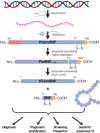Biomarkers for the diagnosis and management of heart failure
- PMID: 33852110
- PMCID: PMC8898236
- DOI: 10.1007/s10741-021-10105-w
Biomarkers for the diagnosis and management of heart failure
Abstract
Heart failure (HF) is a significant cause of morbidity and mortality worldwide. Circulating biomarkers reflecting pathophysiological pathways involved in HF development and progression may assist clinicians in early diagnosis and management of HF patients. Natriuretic peptides (NPs) are cardioprotective hormones released by cardiomyocytes in response to pressure or volume overload. The roles of B-type NP (BNP) and N-terminal pro-B-type NP (NT-proBNP) for diagnosis and risk stratification in HF have been extensively demonstrated, and these biomarkers are emerging tools for population screening and as guides to the start of treatment in subclinical HF. On the contrary, conflicting evidence exists on the role of NPs as a guide to HF therapy. Among the other biomarkers, high-sensitivity troponins and soluble suppression of tumorigenesis-2 are the most promising biomarkers for risk stratification, with independent value to NPs. Other biomarkers evaluated as predictors of adverse outcome are galectin-3, growth differentiation factor 15, mid-regional pro-adrenomedullin, and makers of renal dysfunction. Multi-marker scores and genomic, transcriptomic, proteomic, and metabolomic analyses could further refine HF management.
Keywords: Biomarkers; Heart failure; Inflammation; Natriuretic peptides; SST2; Troponin.
© 2021. The Author(s).
Conflict of interest statement
The authors declare no competing interests.
Figures


References
-
- International Programme on Chemical Safety . Biomarkers in risk assessment: validity and validation. Geneva: World Health Organization; 2001.
Publication types
MeSH terms
Substances
LinkOut - more resources
Full Text Sources
Other Literature Sources
Medical
Research Materials
Miscellaneous

